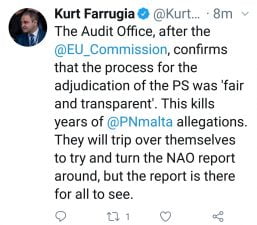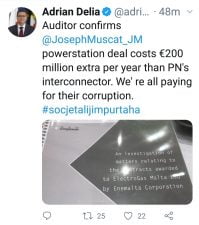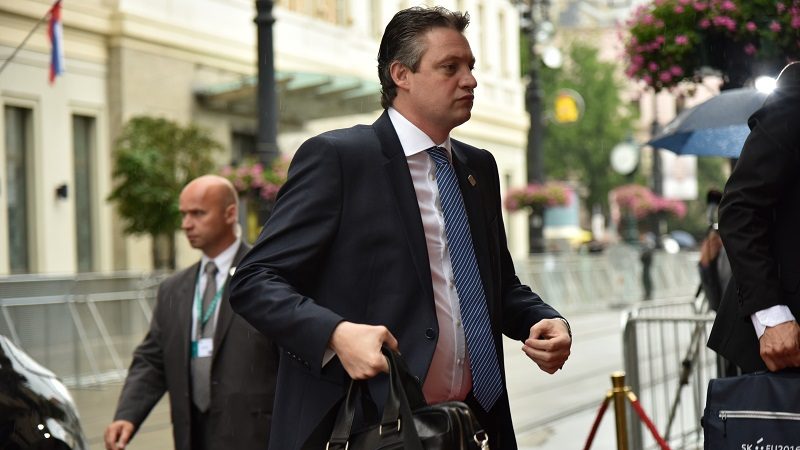A “conservative estimate” by the National Audit Office found energy generated by the new Electrogas power plant to be on average €50.64 /MWh more expensive than the Malta-Sicily interconnector, resulting in millions overcharged to taxpayers.
In a 600-page report on the power station project tabled in Parliament today, the NAO was highly critical of a number of aspects of the project, including evaluation, due diligence, as well as the “risky” and “unprecedented” State guarantee of €360 million given to Electrogas.
The government immediately issued its counter narrative, saying the NAO concluded the “process of adjudication was fair and transparent”. In reality, the report raised a number of major concerns.

Head of government communications Kurt Farrugia.
The NAO referred to the “inconsistent approach” adopted by the evaluation committee in its assessment of submissions.
The final assessment of competing bids was overseen by Brian Tonna, the managing partner of firm that set up the companies exposed in the Panama Papers belonging to Tourism Minister Konrad Mizzi and the Prime Minister’s chief of staff Keith Schembri.
The report concluded the assessment was not equitable, and that the evaluation criteria should have been uniformly applied across the board. The report slammed the lack of due diligence.
Opposition Leader Adrian Delia said the report was “a clear condemnation showing the deal was tampered with from day one.”
“Taxpayers paid an extra €200 million per year than PN’s interconnector. We are all paying for their corruption,” he said.

Opposition Leader Adrian Delia.
The project is at the centre of a major scandal after leaked emails written by Nexia BT said the two Panama companies were to receive payments totalling $2 million from 17 Black, a Dubai firm recently revealed as being owned by Electrogas investor Yorgen Fenech.
The NAO also deemed the €360 million government guarantee to be “irregular”: “The State guarantee was without precedent and was not included as part of the conditions in the call for tenders issued by government”.
The report states that, “the guarantee provided to Electrogas went against government guidelines, as such guarantees can only be provided to government entities, and not private companies”.
The NAO expressed concern on the risk the government undertook with €360 million guarantee. The report notes: “The NAO maintains serious reservations regarding the risk that government was exposed to when the guarantees were in effect”.
Apart from shortcomings in the funding guarantees submitted by Electrogas, the report noted a €20 million shortfall in the required total investment and “limited evidence” of a firm commitment from suppliers to provide gas during the term of the project.
The tendering process was distorted by the late inclusion of the security of supply agreement, and therefore it could not be assured that the selected bid represented the least cost to consumers, the report notes.
The NAO also slammed the transfer of shares from Gasol to the other shareholders of Electrogas, permitting Gasol’s exit from the consortium when it went insolvent.
The assessment also questioned the decision to go for a long term agreement with Azerbaijan’s SOCAR (part of the Electrogas consortium) to deliver the country’s energy needs. “Despite requests for documentation in support of the options identified by Enemalta, the NAO was not provided with evidence of analysis undertaken prior to the commitment to procure power and gas from one supplier”.
The NAO deemed the response by Enemalta on this issue as “superficial”.
The Auditor General also noted that Cabinet authorised Konrad Mizzi to appear on the agreements to terminate the LNG Security of Supply agreement, even though he was not the responsible Minister.













